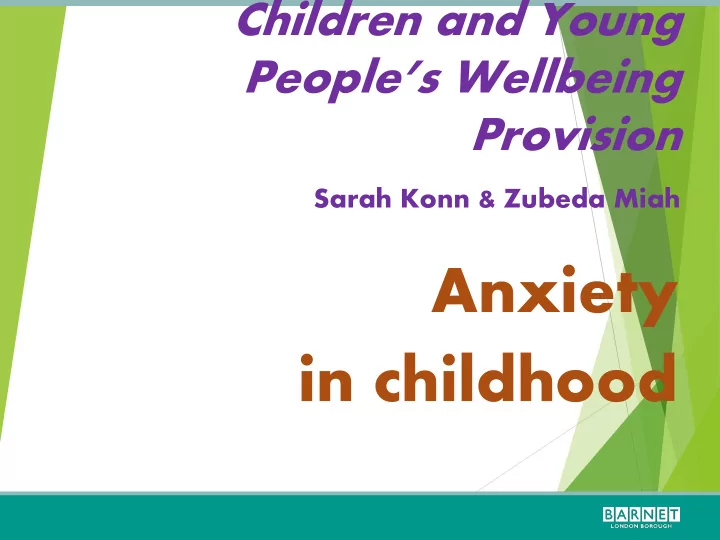

Children and Young People’s Wellbeing Provision Sarah Konn & Zubeda Miah Anxiety in childhood
Common Fears
How do you feel when you are anxious?
Parents/Carers often wonder…. • What does my child have to be anxious about? • If we talk about his/ her worries they’ll get bigger. Isn’t it better to ignore them? Isn’t it better to just jump in the deep end • – toughen them up? Is this fear or are they trying to • manipulate me? • Is this just a phase?
What happens if a child is anxious? Can often feel like to the family that they have been high-jacked. Sometimes plans need to change. Often at the last minute. Can cause anxiety or frustration in the parents / carers Often parents can experience extreme sadness/low confidence as a result We often may question our parenting
Anxiety in children How common are anxiety disorders in children? Nearly 300.000 young people in Britain have an anxiety disorder. In the UK, anxiety disorders are estimated to affect 5-19% of all children and adolescents, and about 2-5% of children younger than 12. Separation anxiety is the most common anxiety disorder in children younger than 12. (NHS)
What is anxiety? Anxiety is a feeling of worry, nervousness, or unease about something with an uncertain outcome. It’s a normal reaction we all at times feel. It is when it persists and affects our daily life that it becomes a problem.
Fight or Flight response
When Anxiety is not helpful
The vicious cycle of anxiety Anxiety involves thoughts, feelings and your behaviour
Slide title Asdfsdf Fhjk
A child with anxiety difficulties may…. Seek reassurance often Avoid situations he/she is worried or frightened of Tell you he/she has a physical pain such as stomach ache Dislike trying new things or taking risks Get upset easily Experience frequent emotional outbursts Avoid talking or eye contact Be very clingy Checking consistently that things are alright
As a parent you may notice your child…. Asks for help for things they can do themselves Does not want to go to school Won’t go to sleep without a parent / carer Complains of feeling unwell frequently Worries about doing things correctly Prefers to watch than have a go Sees the dangerous side of things
Parents / Carers We are biologically programmed to protect and care for our children and to try to always make things better
What maintains your child’s anxiety? Allowing the child to avoid the very thing they’re frightened of Giving constant reassurance to your child Answering them when they constantly check things. Encouraging safety behaviors
Tips for parents/carers • Be aware of your own anxious responses Get them on board to stand up to their anxiety • • Teach them about anxiety • Explore anxious thoughts • Help them learn coping mechanisms • Help them problem solve situations Encourage independence • • Encourage the development of their inner voice • Let the child make choices
If your child is anxious • Model calm and brave behaviour • Avoid constant reassurance • Don’t collude with avoidance • Validate the way they feel • Promote brave and independent behaviour Use strategies to help calm your child • E.g. Breathing techniques, counting backwards, describing things in detail, have a worry time etc. Do not blame or criticize them •
What can you do if you feel that none of these are working Let your SENCO or someone responsible for pastoral care at the school know. Barnet has a new service – Psychological Wellbeing Provision and as Psychological Wellbeing Practitioners we provide guided self help to help your children and yourselves deal with their anxieties. We can also signpost you to other services if we feel that your child’s needs do not meet our criteria.
Resources Recommended books for primary school children:
Any questions???
Recommend
More recommend